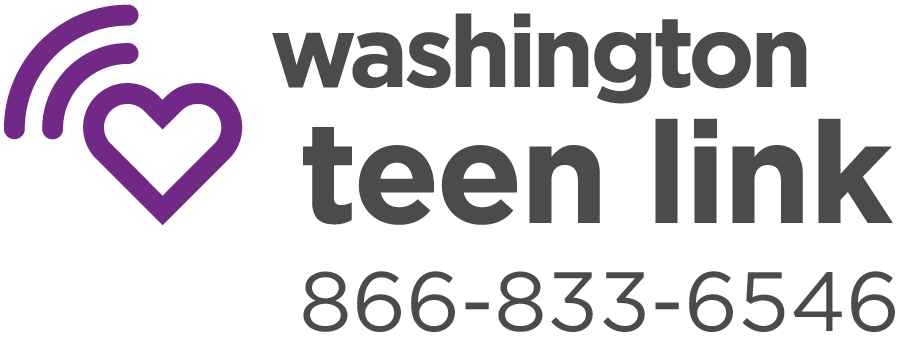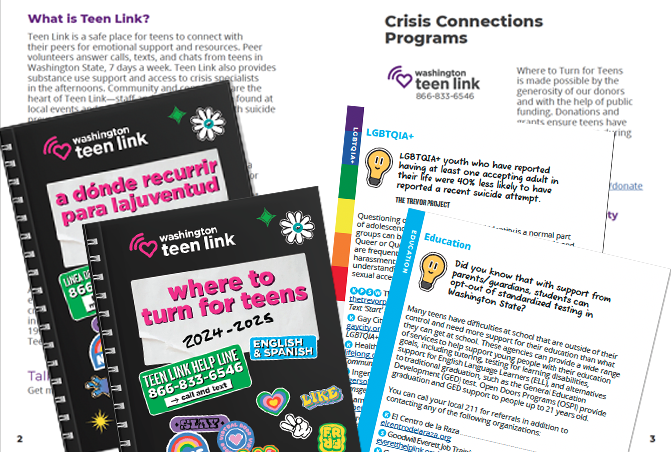“In a generation that’s both talking more about mental health and experiencing more mental health issues, I’m proud to serve the community through Teen Link.”
Youth Volunteer


Talk it Out
We offer several volunteer and intern opportunities for youth, as well as adults in King County and surrounding areas. Learn more about the volunteer opportunities we offer below.
Learn MoreYouth Outreach Workers are out in the community, talking about real issues that impact young people’s lives and learning how we can create change. They teach folks who we are and what we do by: attending community events with other volunteers such as resource fairs, mental health panels, and festivals; visiting other agencies that serve youth; making and putting up posters and distributing Teen Link materials; recruiting other volunteers; attending Monthly Volunteer Meetings. Youth Outreach Workers can also work independently by writing newspaper articles, creating social media content, presenting at their schools, and talking to school officials about Teen Link.
Peer Advisory Committee (PAC) members are the youth leaders of Teen Link responsible for ensuring that the Teen Link program remains youth-driven and attentive to the issues facing young adults. PAC members are required to attend monthly meetings, an annual planning retreat, and special events. They also assist in the recruitment and retention of Teen Link volunteers. PAC members help to facilitate volunteer orientations and help Teen Link staff make decisions about our programs, such as the yearly cover of the Where to Turn for Teens resource guide. All potential members must complete at least six months of involvement at Teen Link to be eligible to join the Peer Advisory Committee.
Youth Crisis Specialists are the voice of Teen Link. They answer calls, chats, and texts on the phone line from teens in Washington State. To qualify for this role, Youth Crisis Specialists must complete our 50-hour phone line training which covers crisis intervention and active listening skills. This training prepares volunteers to talk to callers about issues such as relationships, mental health, dating violence, youth homelessness and suicide. The goal of the training is to help volunteers incorporate the skills into their own communication style. Youth Crisis Specialists work two 4.5-hour shifts per month, providing emotional support, guidance, and referrals to community agencies that serve youth. Youth Crisis Specialists must also attend Monthly Volunteer Meetings, which are typically held on the second Sunday of each month.
Youth Crisis Mentors are adult volunteers who oversee the Youth Crisis Specialists as they answer calls, chats, and texts on the phone line. An interview determines eligibility. Youth Crisis Mentors must complete our 50-hour phone line training alongside the Youth Crisis Specialists they will be mentoring. Responsibilities include: Working three 4.5-hour shifts per month supervising calls and chats; attending one mentor meeting every other month; supporting Youth Crisis Specialists as they gather information, assist callers in clarifying issues and feelings, identify resources, and develop action plans; and helping with promotion and marketing of program as instructed by Teen Link staff, usually in the form of tabling at summer community fairs with youth volunteers.
“In a generation that’s both talking more about mental health and experiencing more mental health issues, I’m proud to serve the community through Teen Link.”
Youth Volunteer
“This incredible resource has given me the tools to help both others and myself with empathy, knowledge, and passion. I am so grateful for this welcoming, accepting place!”
Youth Volunteer
“Working with Teen Link has helped me to develop my interpersonal skills and empathy, but more importantly, it has showed me the impact that a human connection can have on a person’s life and wellbeing.”
Youth Volunteer
Click to share your story on suicide prevention or scroll to bring our trainers from Crisis Connections to your school?
Share your story
Following the WA Department of Health’s guidelines, Crisis Connections offers suicide prevention training for middle school and high school students that are residing in King county and surrounding areas. Each training will go over common warning signs and symptoms of depression and suicidal behaviors.

Schools play an important role in youth suicide prevention. Crisis Connections offers three health curricula designed to be taught by classroom teachers or counselors, and appropriate for students at the elementary, middle, and high school levels: Riding the Waves, LOOK LISTEN LINK, and H.E.L.P.

Where to Turn for Teens (WTTFTs) is a resource guide created especially for youth in King, Pierce, and Snohomish County, covering important topics like:
The agencies listed in WTTFTs can link youth to organizations providing a wide variety of services. The goal of WTTFTs is to make sure teens are aware of the many youth-friendly resources that exist and empower youth to seek help with the support of others.
Help spread awareness by downloading these materials and sharing in your community!





If you are outside of King County and surrounding areas and would like to get involved in supporting youth mental health in your community, below are some additional organizations that may be of help:
Hope Squad
Active Minds
AFSP
Youth.gov
Youth Support:
Washington Al-Anon & Al-Ateen
Counseling Washington – Support Groups
OK2Talk
Parents Support:
7 Days a Week
6-10pm
Call & Text
866-833-6546
Teen Link is a peer-to-peer support line. If you are experiencing a mental health crisis, we encourage you to dial 988, any time, day or night.
Search our Where to Turn for Teens Database for thousands of resources for youth in Washington State